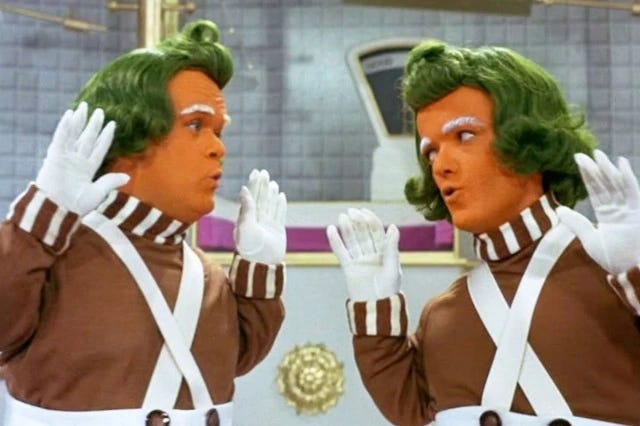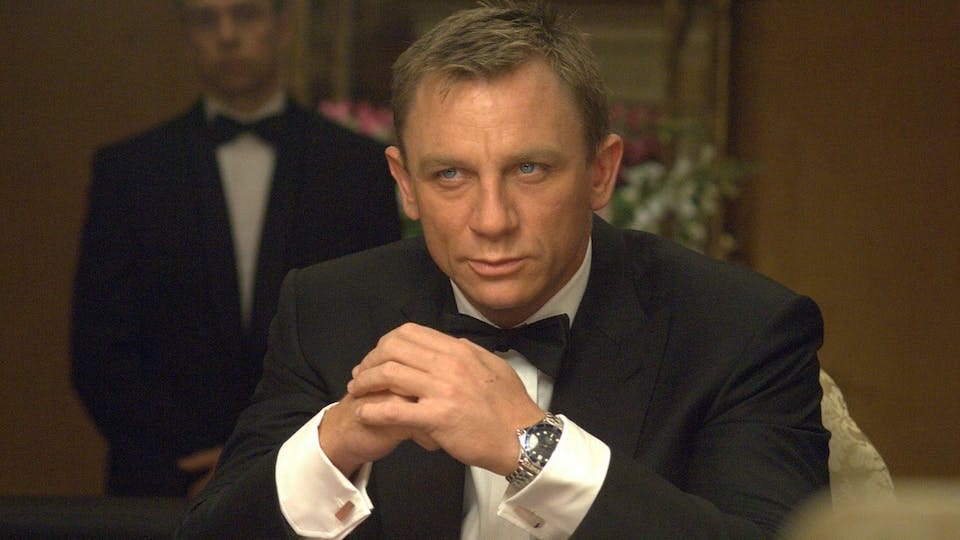Roald Dahl, 007 and the Tortured Revision Missteps
➕ other lessons learned from Britain's recent book misstep

When you come down to it, all Roald Dahl’s U.K. publisher was attempting to do was to make the author’s classic children’s books a tad more palatable for today’s young readers. But in the week since The Telegraph, England’s conservative daily mainstay, outed Puffin U.K’s plan to tweak Dahl’s words, the Penguin Random House subsidiary has suffered such a merciless drubbing that you’d have thought its editors had committed an offense of Augustus Gloop-like proportions.
Though Dahl’s death occurred more than three decades ago, James and the Giant Peach, Charlie and the Chocolate Factory and his other works continue to sell a combined one million copies annually. And Dahl IP remains a powerhouse of astonishing value and durability. Over the past half century, his creative output has been adapted into live-action and animated films, and even a hit Broadway musical. Small wonder that Netflix saw fit to shell out $688 million to secure all development rights for Dahl’s literary canon last year. The company plans to spend an additional $1 billion to fast-track an entire Dahl-verse of streamable entertainment (about a half-dozen are already in development).
Following the rehashing of Dahl’s anti-semitic views in 2020, the latest controversy at first seemed the kind to give studio execs pause. Certainly, the author of the Telegraph article did all they could to amp up the outrage meter, using words like “scrubbed” and “meddling” to describe the changes and attributing the revisions to the "hair-trigger sensibilities" of modern publishing. The article concluded with an ominous warning, surely designed to make people think that the free speech apocalypse is upon us. “The way publishing is going, the rewriting of Roald Dahl may only be the beginning.”
Would Puffin’s impulse for invasive surgery spill over from publishing to Hollywood, imperiling Netflix’s investment? And would fights like this chill the market for older IP that remains a product of its times?
The larger questions may linger, but as regards Dahl, the answer came swiftly and emphatically.
The changes Puffin’s editors implemented were relatively minor, often clumsy and sometimes laughable. For example, in The Witches, Dahl describes a girl as potentially growing up to become a secretary or a cashier. In the revised version, that character is given a possible career boost — as a future scientist or businesswoman. In that same story, "eight nutty little idiots" were replaced with "eight nutty little boys,” while "cloud-men" became "cloud-people." A line about putting people in a meat grinder was cut as were oblique references to skin color (one frightened character now turns "quite pale" as opposed to "white").
The backlash to the changes was immediate. Salman Rushdie denounced the changes as "insane”, tweeting that "Roald Dahl was no angel, but this is absurd censorship. Puffin Books and the Dahl estate should be ashamed." Ricky Gervais mocked the "fragile [and] easily offended" for feeling offended. Even Queen Consort Camilla obliquely weighed in during a speech celebrating the second anniversary of her book club. From the podium, she urged authors "to remain true to your calling, unimpeded by those who may wish to curb the freedom of your expression or impose limits on your imagination,” before doing a mic drop with a spot-on quote from The Witches.


Under siege by literary, comedic and — well — genuinely royal royalty, Puffin admitted its blunder in handling the changes. In a press release, a top executive with Puffin’s parent company struggled to put a positive spin on the imbroglio. "We've listened to the debate over the past week," said Francesca Dow, managing U.K. director of Penguin Random House Children's Books, "which has reaffirmed the extraordinary power of Roald Dahl's books and the very real questions around how stories from another era can be kept relevant for each new generation."
Puffin’s retreat came in the form of a pledge to release two distinct editions of Dahl's books — a revised version incorporating the changes (primarily "designed for children who may be navigating written content independently for the first time") and a classic edition preserving the original text. Readers — or more likely, their parents — will be able to choose which they prefer.
Think of it as the Classic Coke/New Coke answer to this literary problem.
Bond: Shaken and Stirred?

On Monday, as the Dahl controversy was reaching its peak, Ian Fleming Publications announced that it had submitted James Bond to the same sensitivity review that Puffin gave Wonka and his pals, in an attempt to bring the original novels more in line with contemporary values.
Gone from the revised versions are Ian Fleming’s repeated invocation of the n-word, racist descriptions attached to unsavory characters and some god-awful musings about women. Take this just-purged sentence about the lover who ends up betraying Bond in the spy’s debut novel Casino Royale: “And now he knew that she was profoundly, excitingly sensual, but that the conquest of her body, because of the central privacy in her, would each time have the sweet tang of rape.”
The directors of Fleming’s literary estate are only just coming to terms with navigating this minefield, but the makers of the Bond movies figured a way past it long ago. Bond’s “sweet tang of rape” musings had zero chance of besmirching the film version of Casino Royale. Don’t quote me on this, but I can’t recall the n-word ever leaving 007’s lips across more than half a century of Bond movies. Granted, there were plenty of cringe-worthy racial stereotypes in the earlier films, but the Bond franchise has been able to leave that literary baggage ever farther behind with each new iteration, all the while retaining the hero’s suave, debonair, shaken-not-stirred virtues. The source material simply can’t pull that off, no matter how many vigorous scrubbings Fleming’s novels undergo.
That some changes like these were necessary in Dahl’s work was something even the makers of 1971’s Willie Wonka and the Chocolate Factory recognized (as well as grudgingly by the author himself). The original Oompa Loompas were childlike oppressed Black pygmies from the "very deepest and darkest part of the African jungle where no white man had ever been before," whom Wonka had smuggled to England for a life of safety and eternal confectionary servitude. Amid advance criticism from the NAACP, the filmmakers wisely reconfigured the Oompa Loompas as pure fantasy creatures, evidenced by their orange skin, green hair and cute costumes (a change Dahl later added to the books).
Hollywood’s Role in Reimagining IP
Today, time-tested, classic IP is more valuable than ever, even as adaptations of the source material have become ever more liberated from the limitations of the source material’s place and time and prejudices. Mention Charlie and the Chocolate Factory and most people are going to recall the 1971 or 2005 movies long before they’ll begin thinking back on the book (provided any of them actually read it). Likewise, any talk about Casino Royale is far more likely to conjure up the sight of Daniel Craig in a perfectly tailored tux than any snippets of Fleming’s prose.
Hollywood’s endless reboots and variations of Wonka and Bond demonstrate filmmakers’ endless flexibility to reimagine and transcend the underlying IP — and to rid it of its worst Neanderthal qualities. Straight source adaptations of the early Bond novels from the 1950s or the original 1964 edition of Charlie and the Chocolate Factory wouldn’t fly with today’s audiences, and what development exec would be fool enough to try and get them greenlit? The way audiences separate films from source material and accept changes from one medium to the next is why IP isn’t unduly shouldered with all the baggage of its source.
The Dahl experience shows us that actually doing something about a book’s antiquated prejudices can makes things worse in the short run. Many of Puffin’s wounds seem self-inflicted. It could have gotten ahead of some of the backlash if it had been more pro-active in explaining the changes, rather than hoping that they’d quietly fly under the radar.
The Optionist’s Takeaway
If you’re going to make changes, don’t be so clumsy. Dahl has a distinctive style that Puffin’s editors happened to step all over. Updating these older works requires more than doing a simple search and replace. It’s really akin to translating a book from a foreign language where the best versions capture the author’s spirit, rather than just mechanically reproduce the text word for word. And that goes for screen adaptations as well.
Puffin’s executives would have spared themselves a mountain of grief by conceiving the dual-edition model from the beginning. It’s a lesson others should heed. Dual editions could also be a benefit for those adapting material, laying the groundwork (and gauging reactions) for changes that might show up on screen, while muting the kind of backlash that just engulfed the poor Puffin.
When Coca-Cola admitted its mistake after 79 days and brought back Classic Coke to stand alongside New Coke on the shelves, the company turned a PR disaster into a financial win. Within six months, Coke sales were growing at more than double the rate of Pepsi. Puffin executives (and Netflix ones as well) are surely hoping that their zig-zag is just as successful.
That’s a wrap for today, folks. Have Coke and a smile. We’ll see you again Friday for our regular look at the week’s most promising new optionable IP.



